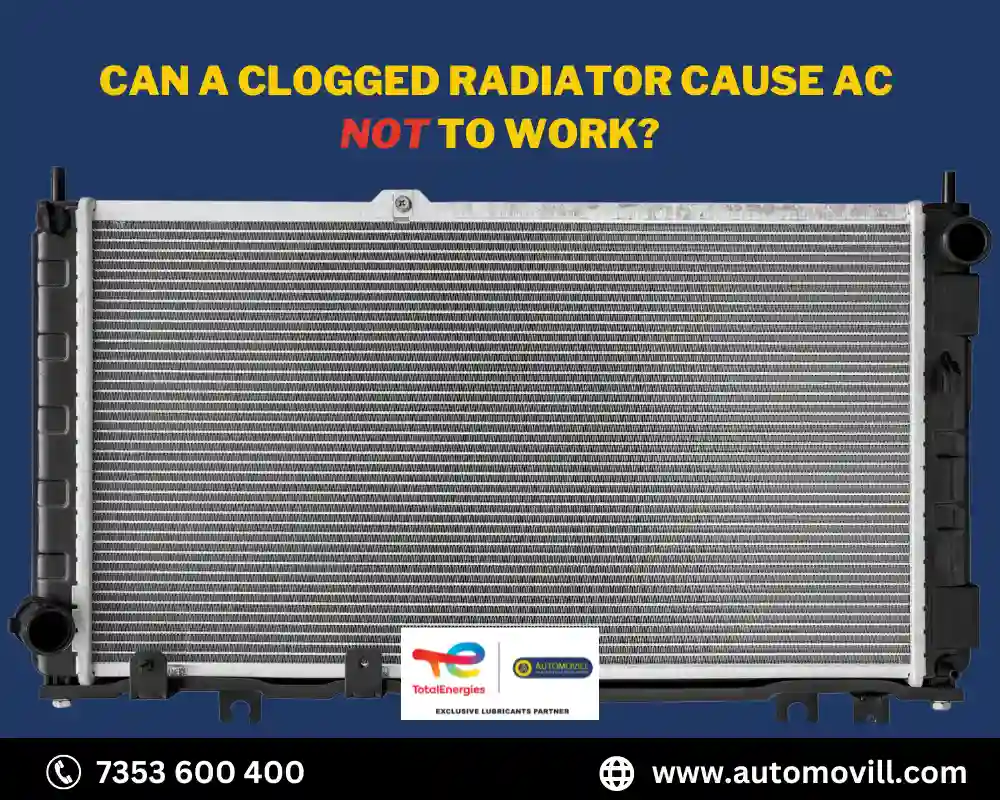
Yes, a clogged radiator can cause the AC not to work. The radiator is responsible for cooling the engine coolant, which also helps to cool the AC condenser. If the radiator is clogged, it will not be able to effectively cool the coolant, which can lead to the AC not working properly.
But first, you must know whether the radiator is clogged or not, and to understand this your car indicates many symptoms of a clogged radiator.
The AC condenser is located in front of the radiator and is responsible for transferring heat from the refrigerant to the air.
When the radiator is clogged, it can restrict airflow to the condenser, which can prevent the refrigerant from being cooled properly. This can lead to the AC not blowing cold air or the AC compressor cycling on and off frequently.
In this blog we will discuss two things in detail –
First, HOW a clogged Radiator can affect the AC system?
Secondly, WHAT are the impacts on AC performance due to a clogged radiator?
HOW a clogged Radiator can affect the AC system?
1) Reduced Engine Cooling
The radiator’s primary job is to cool the engine by dissipating heat generated during combustion. If the radiator is clogged, it will not effectively cool the engine.
As a result, the engine temperature may rise, leading to overheating. In such cases, modern vehicles are equipped with engine temperature sensors that can trigger a safety mechanism to reduce engine performance and power, which could also affect the AC system’s performance.
2) Excessive Load on Engine
When the engine is running hotter due to a clogged radiator, it may put more load on the engine. This increased load can impact the overall power output of the engine, including the power available to run auxiliary systems like the AC compressor.
3) Shared Engine Components
The AC compressor is typically driven by a belt connected to the engine’s crankshaft. If the engine’s performance is compromised due to overheating caused by a clogged radiator, it could lead to a reduction in available power for the AC compressor.
This might result in reduced AC performance or even the AC system not working properly.
WHAT are the impacts on AC due to a clogged radiator?
A clogged radiator can have a number of negative impacts on your car’s AC system, including:
1) Reduced airflow
The radiator is responsible for cooling the engine coolant, which also helps to cool the AC condenser.
If the radiator is clogged it can lead to reduced airflow to the condenser. This can prevent the refrigerant from being cooled properly, which can lead to the AC not blowing cold air.
2) Increased pressure
As the refrigerant is not cooled properly, the pressure in the AC system can increase. This can put stress on the compressor and other components, and could eventually lead to a breakdown.
3) Compressor Cycling ON and OFF
The compressor is responsible for circulating the refrigerant through the AC system.
If the refrigerant is not cooled properly, the compressor may cycle on and off frequently in an attempt to maintain the desired temperature. This can put stress on the compressor and shorten its lifespan.
4) Leaks
A clogged radiator can also lead to leaks in the AC system. This is because the high pressure in the system can cause the seals to fail. Leaks can lead to loss of refrigerant, which can make the AC less effective.
Other Causes of AC Not Working
- Freon Leak (Refrigerant)
- AC Compressor Failure
- Clogged or leaking condenser
- Faulty thermostat
- Faulty blower motor
Tips To Prevent Radiator From Clogging
- Flush the radiator regularly with a radiator flush solution.
- Keep the radiator fins clean and free of debris.
- Use a high-quality radiator coolant.
- Inspect the radiator for leaks regularly.
By following these tips, you can help to keep your radiator in good condition and prevent it from clogging, which can help to keep your AC working properly.
If you are having problems with your AC, it is important to have it inspected by a qualified mechanic to determine the cause of the problem.
